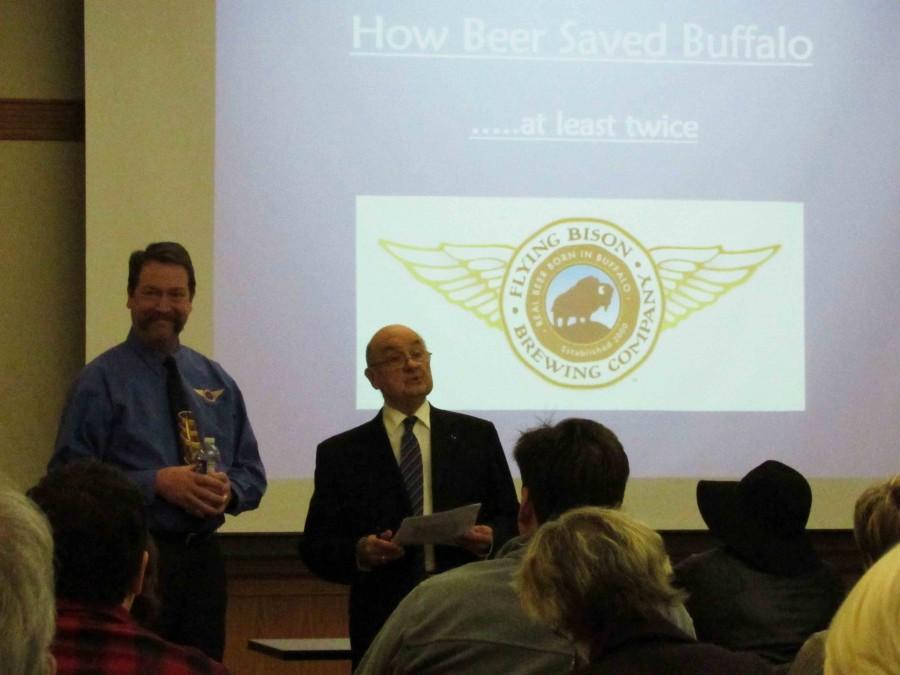Flying Bison, Big Ditch owners discuss craft beer in Buffalo
Flying Bison Brewery Owner Tim Herzog (pictured left) presented his lecture about the history of Buffalo brewing on Tuesday, Jan. 26 in the E.H. Butler Library.
February 16, 2016
In 2000, Tim Herzog founded Flying Bison Brewery – Buffalo’s first standalone brewery to open since prohibition – in order to revive Buffalo’s rich brewing culture which extends back to the early 1800s, and to create new, flavorful beers which he had trouble finding in the area at the time.
Between 2000 and 2011, Flying Bison Brewing Co., Pearl Street Brewery and The Buffalo Brewpub were the only breweries in the Buffalo area, with Flying Bison being the only distributing brewery.
But since 2011, Buffalo has caught the craft brewing fever; over a dozen new breweries have opened in the area in the last five years, including at least five in 2015 alone, and many credit Herzog and Flying Bison for leading the charge.
“Well, I’m the oldest one,” Herzog said, unwilling to take any credit for Buffalo’s booming brewing culture. “When you look at the growth and the positive image that the city’s starting to take, there’s a little more shine on the apple than there was even three-four years ago.
“A lot of the things that are being talked about, a lot of the things that get people out of their houses are going to take a brewery tour or going out for a beer with friends. It’s a good mover and shaker in the economy, and has been since the city was founded.”
Herzog, the vice president of the Buffalo Niagara Brewers’ Association and a SUNY Buffalo State alum (’82), held a lecture at Buffalo State’s E.H Butler Library on Tuesday, Jan. 26, titled “How Beer Saved Buffalo.”
“The first commercial building in Buffalo was an inn that brewed their own beer, so Buffalo literally grew up around a brewery,” Herzog said. “Before prohibition, there were 35 breweries open and operating in the city of Buffalo.”
During his lecture, Herzog provided a detailed timeline about Buffalo’s brewing history, which was influenced greatly by the Erie Canal.
In 2011, Matt Kahn was working with Corey Catalano in a biotech lab when they caught the entrepreneurial bug and decided to look into opening a brewery. In fall of 2014, they opened Big Ditch Brewing Co. in downtown Buffalo – its name inspired by the Erie Canal.
“There weren’t too many craft breweries in Buffalo, but craft beer was blowing up all over the place,” Kahn said. “We both loved beer, and making beer is an art, but it’s also a science; there’s a lot of biology and chemistry involved, and that’s what we were good at.”
Big Ditch was one of the first Buffalo breweries of the recent wave of new breweries which have opened in the area. In 2015 alone, five new breweries opened in the greater Buffalo area: Resurgence Brewing on Niagara Street, 42 North Brewing in East Aurora, New York Beer Project in Lockport, 12 Gates Brewing in Williamsville and Rusty Nickel Brewing in West Seneca.
The brewing culture in Buffalo encourages new brewers; established brewers see new, aspiring brewers as allies rather than business competitors. In the city of friendly neighbors, the craft beer industry is a collaboration, rather than a competition.
“Everybody’s willing to be friends with everybody,” Herzog said. “If somebody needs a bag of malt, they can call up on the phone; somebody was here the other day. The camaraderie amongst the brewers is really strong.
“The people coming on are doing some really interesting things. Everybody’s got their own thing, their own niche, and that’s been fun to watch. There’s not too much stepping on toes, everybody’s respectful of everybody else.”
Kahn, who is also on the Buffalo Niagara Brewers’ Association board of directors, feels that the competition is not the other craft brewers, but rather the macro brewers like Anheuser-Busch, which owns Budweiser, Michelob, Busch, Rolling Rock and many other domestic beers producers.
“Buffalo’s come a long way, even since 2011 when we first hatched this crazy scheme,” Kahn said. “All the local brewers are working together against big macro beer. As many breweries as there are, and as much craft beer as we’re selling, it’s still very small compared to how much of your macro American lagers you’re selling.”
The craft brewing culture has played a significant role in Buffalo’s recent economic revival, and with new, flavorful local varieties of IPAs, stouts, porters and wheat beers on drink menus across Buffalo’s bars and restaurants, the craft beer movement is one in which the local economy and consumer both benefit.
email: [email protected]





